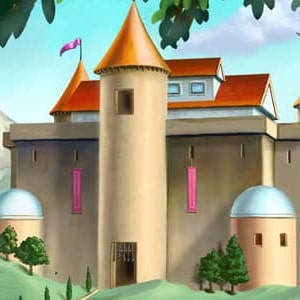Reading time: 17 min
There was once a King who had an illness, and no one believed that he would come out of it with his life. He had three sons who were much distressed about it, and went down into the palace-garden and wept. There they met an old man who inquired as to the cause of their grief. They told him that their father was so ill that he would most certainly die, for nothing seemed to cure him.
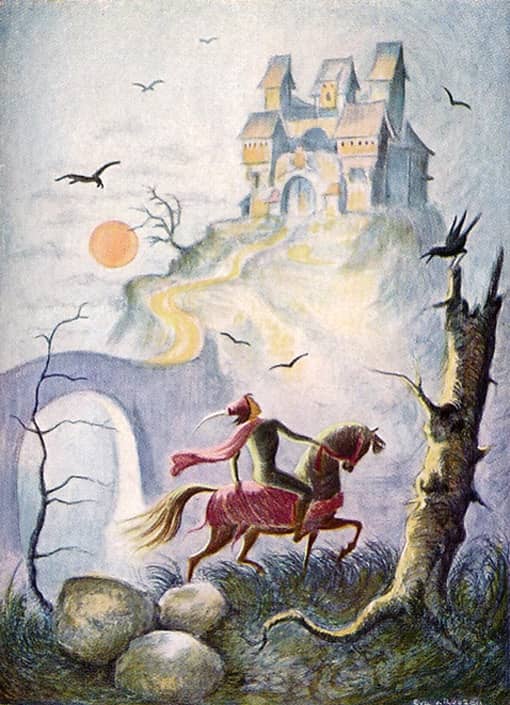
Then the old man said, „I know of one more remedy, and that is the water of life. If he drinks of it he will become well again; but it is hard to find.“ The eldest said, „I will manage to find it,“ and went to the sick King, and begged to be allowed to go forth in search of the water of life, for that alone could save him. „No,“ said the King, „the danger of it is too great. I would rather die.“ But he begged so long that the King consented. The prince thought in his heart, „If I bring the water, then I shall be best beloved of my father, and shall inherit the kingdom.“ So he set out, and when he had ridden forth a little distance, a dwarf stood there in the road who called to him and said, „Whither away so fast?“ – „Silly shrimp,“ said the prince, very haughtily, „it is nothing to do with you,“ and rode on.
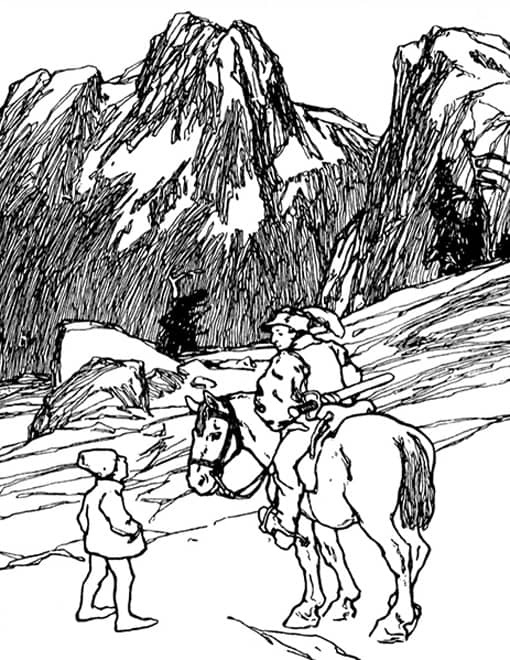
But the little dwarf had grown angry, and had wished an evil wish. Soon after this the prince entered a ravine, and the further he rode the closer the mountains drew together, and at last the road became so narrow that he could not advance a step further. It was impossible either to turn his horse or to dismount from the saddle, and he was shut in there as if in prison. The sick King waited long for him, but he came not. Then the second son said, „Father, let me go forth to seek the water,“ and thought to himself, „If my brother is dead, then the kingdom will fall to me.“ At first the King would not allow him to go either, but at last he yielded, so the prince set out on the same road that his brother had taken, and he too met the dwarf, who stopped him to ask, whither he was going in such haste? „Little shrimp,“ said the prince, „that is nothing to thee,“ and rode on without giving him another look. But the dwarf bewitched him, and he, like the other, rode into a ravine, and could neither go forwards nor backwards. So fare haughty people. As the second son also remained away, the youngest begged to be allowed to go forth to fetch the water, and at last the King was obliged to let him go. When he met the dwarf and the latter asked him whither he was going in such haste, he stopped, gave him an explanation, and said, „I am seeking the water of life, for my father is sick unto death.“ – „Dost thou know, then, where that is to be found?“ – „No,“ said the prince. „As thou hast borne thyself as is seemly, and not haughtily like thy false brothers, I will give thee the information and tell thee how thou mayst obtain the water of life. It springs from a fountain in the courtyard of an enchanted castle, but thou wilt not be able to make thy way to it, if I do not give thee an iron wand and two small loaves of bread. Strike thrice with the wand on the iron door of the castle and it will spring open: inside lie two lions with gaping jaws, but if thou throwest a loaf to each of them, they will be quieted. Then hasten to fetch some of the water of life before the clock strikes twelve, else the door will shut again, and thou wilt be imprisoned.“
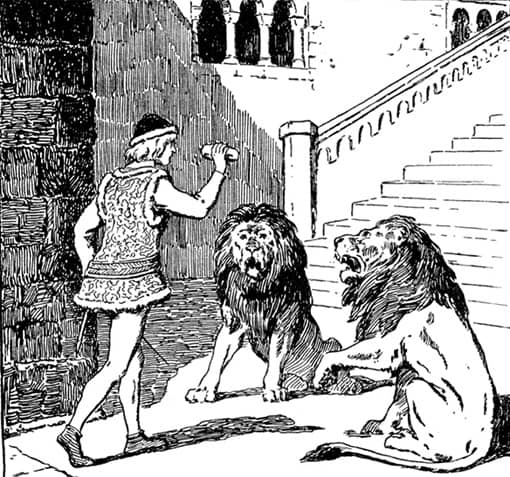
The prince thanked him, took the wand and the bread, and set out on his way. When he arrived, everything was as the dwarf had said. The door sprang open at the third stroke of the wand, and when he had appeased the lions with the bread, he entered the castle, and came to a large and splendid hall, wherein sat some enchanted princes whose rings he drew off their fingers. A sword and a loaf of bread were lying there, which he carried away. After this, he entered a chamber, in which was a beautiful maiden who rejoiced when she saw him, kissed him, and told him that he had delivered her, and should have the whole of her kingdom, and that if he would return in a year their wedding should be celebrated; likewise she told him where the spring of the water of life was, and that he was to hasten and draw some of it before the clock struck twelve. Then he went onwards, and at last entered a room where there was a beautiful newly-made bed, and as he was very weary, he felt inclined to rest a little. So he lay down and fell asleep. When he awoke, it was striking a quarter to twelve. He sprang up in a fright, ran to the spring, drew some water in a cup which stood near, and hastened away.
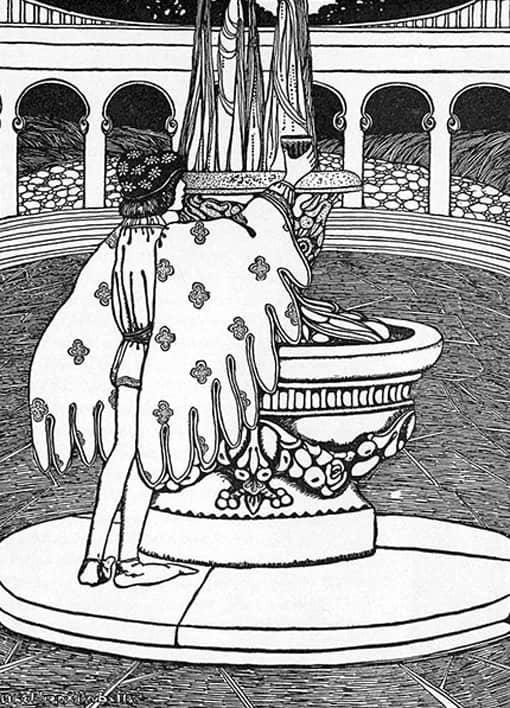
But just as he was passing through the iron door, the clock struck twelve, and the door fell to with such violence that it carried away a piece of his heel. He, however, rejoicing at having obtained the water of life, went homewards, and again passed the dwarf. When the latter saw the sword and the loaf, he said, „With these thou hast won great wealth; with the sword thou canst slay whole armies, and the bread will never come to an end.“ But the prince would not go home to his father without his brothers, and said, „Dear dwarf, canst thou not tell me where my two brothers are? They went out before I did in search of the water of life, and have not returned.“ – „They are imprisoned between two mountains,“ said the dwarf. „I have condemned them to stay there, because they were so haughty.“ Then the prince begged until the dwarf released them; but he warned him, however, and said, „Beware of them, for they have bad hearts.“ When his brothers came, he rejoiced, and told them how things had gone with him, that he had found the water of life and had brought a cupful away with him, and had rescued a beautiful princess, who was willing to wait a year for him, and then their wedding was to be celebrated and he would obtain a great kingdom. After that they rode on together, and chanced upon a land where war and famine reigned, and the King already thought he must perish, for the scarcity was so great. Then the prince went to him and gave him the loaf, wherewith he fed and satisfied the whole of his kingdom, and then the prince gave him the sword also wherewith he slew the hosts of his enemies, and could now live in rest and peace. The prince then took back his loaf and his sword, and the three brothers rode on. But after this they entered two more countries where war and famine reigned and each time the prince gave his loaf and his sword to the Kings, and had now delivered three kingdoms, and after that they went on board a ship and sailed over the sea. During the passage, the two eldest conversed apart and said, „The youngest has found the water of life and not we, for that our father will give him the kingdom the kingdom which belongs to us, and he will rob us of all our fortune.“ They then began to seek revenge, and plotted with each other to destroy him. They waited until they found him fast asleep, then they poured the water of life out of the cup, and took it for themselves, but into the cup they poured salt sea-water. Now therefore, when they arrived home, the youngest took his cup to the sick King in order that he might drink out of it, and be cured. But scarcely had he drunk a very little of the salt sea-water than he became still worse than before. And as he was lamenting over this, the two eldest brothers came, and accused the youngest of having intended to poison him, and said that they had brought him the true water of life, and handed it to him. He had scarcely tasted it, when he felt his sickness departing, and became strong and healthy as in the days of his youth. After that they both went to the youngest, mocked him, and said, „You certainly found the water of life, but you have had the pain, and we the gain. You should have been sharper, and should have kept your eyes open. We took it from you whilst you were asleep at sea, and when a year is over, one of us will go and fetch the beautiful princess. But beware that you do not disclose aught of this to our father; indeed he does not trust you, and if you say a single word, you shall lose your life into the bargain, but if you keep silent, you shall have it as a gift.“
The old King was angry with his youngest son, and thought he had plotted against his life. So he summoned the court together and had sentence pronounced upon his son, that he should be secretly shot. And once when the prince was riding forth to the chase, suspecting no evil, the King’s huntsman had to go with him, and when they were quite alone in the forest, the huntsman looked so sorrowful that the prince said to him, „Dear huntsman, what ails you?“ The huntsman said, „I cannot tell you, and yet I ought.“ Then the prince said, „Say openly what it is, I will pardon you.“ – „Alas!“ said the huntsman, „I am to shoot you dead, the King has ordered me to do it.“ Then the prince was shocked, and said, „Dear huntsman, let me live; there, I give you my royal garments; give me your common ones in their stead.“ The huntsman said, „I will willingly do that, indeed I should not have been able to shoot you.“ Then they exchanged clothes, and the huntsman returned home. The prince, however, went further into the forest. After a time three waggons of gold and precious stones came to the King for his youngest son, which were sent by the three Kings who had slain their enemies with the prince’s sword, and maintained their people with his bread, and who wished to show their gratitude for it. The old King then thought, „Can my son have been innocent?“ and said to his people, „Would that he were still alive, how it grieves me that I have suffered him to be killed!“ – „He still lives,“ said the huntsman, „I could not find it in my heart to carry out your command,“ and told the King how it had happened. Then a stone fell from the King’s heart, and he had it proclaimed in every country that his son might return and be taken into favour again.
The princess, however, had a road made up to her palace which was quite bright and golden, and told her people that whosoever came riding straight along it to her, would be the right wooer and was to be admitted, and whoever rode by the side of it, was not the right one, and was not to be admitted. As the time was now close at hand, the eldest thought he would hasten to go to the King’s daughter, and give himself out as her deliverer, and thus win her for his bride, and the kingdom to boot. Therefore he rode forth, and when he arrived in front of the palace, and saw the splendid golden road, he thought, it would be a sin and a shame if he were to ride over that, and turned aside, and rode on the right side of it. But when he came to the door, the servants told him that he was not the right man, and was to go away again. Soon after this the second prince set out, and when he came to the golden road, and his horse had put one foot on it, he thought, it would be a sin and a shame to tread a piece of it off, and he turned aside and rode on the left side of it, and when he reached the door, the attendants told him he was not the right one, and he was to go away again. When at last the year had entirely expired, the third son likewise wished to ride out of the forest to his beloved, and with her forget his sorrows. So he set out and thought of her so incessantly, and wished to be with her so much, that he never noticed the golden road at all. So his horse rode onwards up the middle of it, and when he came to the door, it was opened and the princess received him with joy, and said he was her deliverer, and lord of the kingdom, and their wedding was celebrated with great rejoicing. When it was over she told him that his father invited him to come to him, and had forgiven him. So he rode thither, and told him everything; how his brothers had betrayed him, and how he had nevertheless kept silence. The old King wished to punish them, but they had put to sea, and never came back as long as they lived.
 Learn languages. Double-tap on a word.Learn languages in context with Childstories.org and Deepl.com.
Learn languages. Double-tap on a word.Learn languages in context with Childstories.org and Deepl.com.Backgrounds
Interpretations
Adaptions
Summary
Linguistics
„The Water of Life“ is a German fairy tale collected by the Brothers Grimm and published in their famous anthology „Grimm’s Fairy Tales“ (originally titled „Kinder- und Hausmärchen“) in 1812. The Brothers Grimm, Jacob and Wilhelm, were German scholars, linguists, and cultural researchers who collected and published traditional folklore and fairy tales during the 19th century. Their work played a significant role in preserving German oral traditions and popularizing fairy tales as a literary genre.
„The Water of Life“ tells the story of a dying king who sends his three sons on a quest to find the legendary Water of Life to cure his illness. The youngest son, often referred to as the Simpleton or Simple-minded, is dismissed by his father and elder brothers as unfit for the task. However, through acts of kindness and humility, he manages to overcome various challenges and finds the Water of Life. Meanwhile, his elder brothers betray him and try to steal the credit for his success. Ultimately, the truth is revealed, and the youngest son is rewarded for his virtues with a kingdom and a princess, while the elder brothers face the consequences of their greed.
The tale has been adapted and retold in various forms, including illustrated books, movies, and television shows. It is a classic example of a fairy tale that teaches valuable life lessons and morals, such as the importance of humility, kindness, and the consequences of greed.
„The Water of Life“ by the Brothers Grimm can be interpreted in various ways, touching on themes such as the importance of humility, the consequences of greed, and the power of kindness.
Humility: The youngest prince demonstrates humility in his interactions with others, including the dwarf and the kings he helps. In contrast, his older brothers are haughty and dismissive, leading to their downfall. This fairy tale teaches the value of treating others with respect and humility, regardless of their appearance or status.
Consequences of Greed: The two elder brothers are driven by their desire for power and wealth, causing them to betray their youngest brother. Their greed ultimately leads to their exile and failure to achieve their goals. The story serves as a warning against the destructive nature of greed and the importance of maintaining integrity in the pursuit of one’s desires.
The Power of Kindness: The youngest prince’s acts of kindness, both to the dwarf and the three kingdoms he saves, are rewarded in various ways throughout the story. He is given the tools to succeed in his quest, forms alliances with powerful kings, and eventually marries the princess and inherits the kingdom. The tale emphasizes the impact of kindness and selflessness, which can not only benefit others but also bring about positive outcomes for those who practice them.
Forgiveness and Redemption: The king’s initial judgment of his youngest son is harsh, but upon learning the truth, he forgives him and welcomes him back into the kingdom. This aspect of the story highlights the importance of forgiveness and the possibility of redemption, even when one has been wronged or misunderstood.
Overall, „The Water of Life“ offers valuable lessons about humility, kindness, the consequences of greed, and the power of forgiveness. The story encourages readers to treat others with respect, act selflessly, and maintain their integrity in the face of adversity.
„The Water of Life“ is a popular fairy tale that has been adapted and retold in various forms. Here are some notable adaptations of the tale.
Disney’s „Snow White and the Seven Dwarfs“: The 1937 animated film features a scene where the Evil Queen sends the Huntsman to kill Snow White and bring back her heart as proof. Instead, the Huntsman spares Snow White’s life and brings back the heart of a pig. The Huntsman is then ordered to bring back the heart of Snow White, but he helps her escape and gives her directions to the home of the seven dwarfs. In the film, the scene with the Huntsman is inspired by „The Water of Life,“ with the heart of the pig representing the deception used by the youngest son to trick his older brothers.
„The Well of the World’s End“: This is a retelling of „The Water of Life“ by Scottish author Fiona Macleod. The story features a king who is dying and three sons who set out on a quest to find the Well of the World’s End, a magical well that can cure any illness. The story has a mystical and poetic tone, and the characters are portrayed as archetypes.
„The Golden Apples“: This is a retelling of „The Water of Life“ by Nathaniel Hawthorne. In the story, a king falls ill, and his three sons set out on a quest to find the golden apples of immortality. The story has a moralistic tone and explores themes of greed, temptation, and redemption.
„The Three Golden Apples“: This is a retelling of „The Water of Life“ by American author Nathaniel Hawthorne. In the story, a king becomes ill, and his son sets out on a quest to find the three golden apples of the Hesperides, which can cure any illness. The story features elements of Greek mythology and explores themes of heroism and the search for knowledge.
„The Water of Life“: This is an opera based on the fairy tale by German composer Georg Friedrich Haendel. The opera was first performed in London in 1710 and features a complex plot with a variety of characters and musical styles. The opera explores themes of love, heroism, and redemption, and features several magical elements, including a singing bird and a fountain of youth.
„The Water of Life“ is a fairy tale by Brothers Grimm about a sick king and his three sons who seek a cure for their father’s illness. In the story, an old man tells the brothers about the water of life, which can heal their father. The eldest and second sons set out to find it, but their arrogance leads them to be trapped by a dwarf. The youngest son, who is humble, is given an iron wand and two loaves of bread by the dwarf, who instructs him on how to find the water of life.
Following the dwarf’s guidance, the youngest prince enters an enchanted castle, frees a beautiful princess, and finds the water of life. He also obtains a magical sword and loaf of bread that can feed and protect entire kingdoms. On his way home, the prince saves three kingdoms from war and famine with the magical items. His elder brothers, jealous of his success, steal the water of life and replace it with saltwater, causing their father’s condition to worsen.
The elder brothers accuse the youngest of attempting to poison their father and present the stolen water of life as their own. The king recovers, and the youngest son is sentenced to be secretly killed by the king’s huntsman. The huntsman, however, cannot bring himself to do it, and the prince is allowed to live.
The princess the prince had saved creates a golden road to her palace, stating that the one who rides directly on it is her true savior. The elder brothers, trying to claim the princess, avoid riding on the golden road and are rejected. The youngest prince, focused on his love for the princess, rides straight on the road and is accepted as her true savior. They marry, and the prince is reunited with his father, who forgives him.
The prince reveals his brothers‘ betrayal, but they have already fled the kingdom, never to return.
The Brothers Grimm’s „The Water of Life“ is a classic fairy tale that exhibits several linguistic and thematic characteristics typical of the genre.
Here are some aspects of its linguistic analysis:
Simple Sentence Structure
The tale predominantly uses simple and compound sentences. This simplicity makes it accessible to a broad audience, including children, and helps convey the story in a straightforward manner.
Repetitive Language
Repetition of Phrases: Phrases like „water of life“ and „silly shrimp“ are repeated, which emphasize key plot points and enhance memorability.
Recurrent Patterns: The story employs a rule of three with the three brothers‘ quests, a common structure in fairy tales that helps build rhythm and expectation.
Archaic and Formulaic Expressions
The language has a formal and archaic quality, with phrases like „whither away so fast?“ and „alas!“ These expressions give the story a timeless, legendary feel.
Moral and Didactic Tone
The story uses dialogue and narrative to imbue moral lessons, such as humility versus arrogance, the value of kindness, and the importance of being vigilant. The dwarf’s interactions with the brothers illustrate this clearly.
Stylistic Features
Direct Speech: The use of dialogue makes the narrative lively and allows characters to express their intentions and emotions directly.
Descriptive Language: Although not overly detailed, descriptive language is used effectively to paint scenes, such as the „large and splendid hall,“ enhancing the magical atmosphere.
Symbolism and Motifs
The Water of Life: Symbolizes healing, redemption, and the quest for precious values.
Golden Road and Iron Door: Signify the path of virtue and the barrier to achieving one’s goals, respectively.
Enchanted Castle: Represents the challenges and rewards inherent in a hero’s journey.
Character Archetypes
The Good Youngest Son: An archetype of virtue, often seen in fairy tales as the true hero.
Evil Siblings: Common antagonists who provide contrast to the protagonist’s integrity.
Wise Old Man (Dwarf): The helper who provides the hero with crucial knowledge and tools.
Narrative Structure
Quest Narrative: The protagonist’s journey to obtain the water of life embodies the classic hero’s quest, complete with trials, rewards, and eventual triumph.
Resolution: The story concludes with the rightful reward for virtue and the punishment (or exile) of treachery.
Overall, „The Water of Life“ uses its linguistic and stylistic features to reinforce its themes of morality, courage, and justice, all hallmarks of the Brothers Grimm’s storytelling approach. The tale’s language contributes to building a narrative that feels both magical and instructional, resonating with readers across generations.
Information for scientific analysis
Fairy tale statistics | Value |
|---|---|
| Number | KHM 97 |
| Aarne-Thompson-Uther-Index | ATU Typ 551 |
| Translations | DE, EN, EL, DA, ES, FR, PT, IT, JA, NL, PL, RU, TR, VI, ZH |
| Readability Index by Björnsson | 36.7 |
| Flesch-Reading-Ease Index | 76.6 |
| Flesch–Kincaid Grade-Level | 9 |
| Gunning Fog Index | 11.7 |
| Coleman–Liau Index | 7.5 |
| SMOG Index | 8.6 |
| Automated Readability Index | 10.2 |
| Character Count | 11.958 |
| Letter Count | 9.213 |
| Sentence Count | 90 |
| Word Count | 2.323 |
| Average Words per Sentence | 25,81 |
| Words with more than 6 letters | 254 |
| Percentage of long words | 10.9% |
| Number of Syllables | 2.858 |
| Average Syllables per Word | 1,23 |
| Words with three Syllables | 78 |
| Percentage Words with three Syllables | 3.4% |
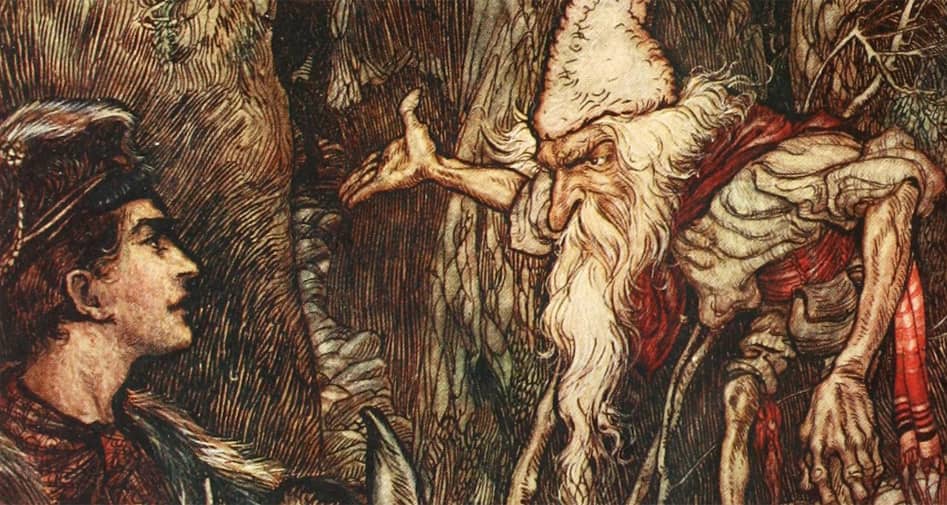
 Facebook
Facebook  Whatsapp
Whatsapp  Messenger
Messenger  Telegram
Telegram Reddit
Reddit